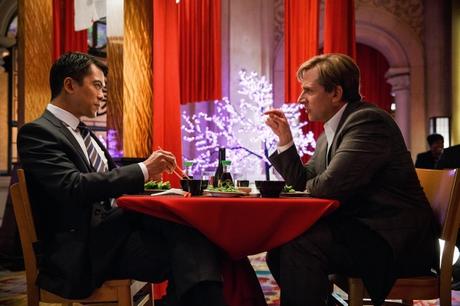
Halfway through War Dogs, the two young con men (played by Jonah Hill and Miles Teller) at the heart of the story attend a specialized convention in Las Vegas. Their partnership as government contract arms dealers will enter an entirely new stratosphere if they can somehow muscle in on a lucrative new deal to supply the U.S.-trained Afghan National Army with enough weapons and bullets to last them the next 30 years. To do so, though, will mean exploiting multiple loopholes and seriously hustling various vendors and government agencies, which is why they're in Vegas for one of the world's largest arms trade shows. In the end, the rather shady business contact they make (played to ice cold perfection by Bradley Cooper) who breaks the deal wide open for them candidly talks shop in a nearby Vegas restaurant, away from the prying eyes of the convention floor.
Does any of this sound a little familiar? A couple of outsiders exploit a flaw in an already flawed system, and come out of it richer than their wildest dreams? I half expected the camera to pan away from Hill, Teller and Cooper to reveal Steve Carell seated on the other side of the restaurant talking to the U.S. government's collateralized debt obligation manager as if War Dogs and The Big Short shared a cinematic universe.

In fact, the real history behind both movies reveals these pivotal Vegas moments both occurred in 2007. Mark Baum (Carell) interviewed CDO manager Wing Chau at the American Securitization Forum in January. David Packouz (Teller) and Efraim Diveroli (Hill) met Heinrich Thomet (Cooper), a Swiss arms dealer, in June, although War Dogs changes the setting (the real meeting took place in Paris, not Vegas). By keeping it in Vegas, War Dogs seems to be aping Big Short while also perhaps nodding toward director Todd Phillips' more famous Hangover films.
War Dogs is not The Big Short, though. Phillips uses some of the same cinematic tricks as that film's director, Adam McKay, another comedy guy who went political. For example, there are a series of title cards with pithy quotes to separate the story into different segments. Difficult economic concepts are explained to us through narration and nifty visuals, such as one early stock footage sequence of real U.S. soldiers which Phillips has augmented with lines and text boxes to pinpoint just how much the American taxpayer pays for each part of the soldier's uniform.
However, unlike Big Short War Dogs is a story about internal corruption, not external. It's a buddy comedy where the buddies are torn apart by greed, and Phillips seems far more interested in telling their story than making any kind of real specific statement about the Military Industrial Complex or the Bush Administration's foreign policies. This lack of a pronounced point of view on the subject leaves War Dogs in a strange position. In setting, casting and subject matter it alternately recalls The Big Short, Wolf of Wall Street and Lord of War, and at times it is equally as strong as any of them. However, at other times it feels like weak tea by comparison.
It's a film whose tone betrays its origins: While prepping The Hangover 2, Phillips read a Rolling Stone article about two twenty-something stoner-hustlers who somehow ended up as international gun runners, and he thought it was a pretty cool story, in a "Can you believe this happened?" kind of way. That's the mentality he carried over into the film, and on that level definitely War Dogs works.
What Packouz and Diveroli pulled off is fairly amazing, and Jonah Hill, in a domineering, career-best performance, nails the latter's unyielding greed and sociopathy while adding a truly bizarre and seemingly disingenuous laugh on top of it. Teller is nearly as strong in the understated straight man role. He provides all of the narration, meaning he carries the burden of explaining everything to us while also coming off as relatable instead of reprehensible. Given Teller's dickish reputation in real life, you might be surprised at how likable he makes Packouz.
To sum up the plot, Packouz is adrift in life, working as a masseuse in Miami and striking out on his one big business idea (i.e., selling high-end sheets to retirement homes). His girlfriend is pregnant, and he needs money.
Enter Diveroli, an old high school buddy back in town and making thousands as an arms dealer, bidding on low-end government defense contracts. As Diveroli puts it, everyone else is going after the sandwich (i.e., the really big contracts) while he lives off of the crumbs. This was only possible because the Bush Administration was forced to make every potential government contract publicly available for bid after being caught funneling such contracts to companies like Halliburton.
Both as a favor and also as a direct reflection of how much help he needs sifting through the thousands of contracts, Diveroli hires Packouz and....oh, that's probably enough of the plot. Simply saying "dollar, dollar bills, y'all" covers a lot of what happens next.
As Phillips told IndieWire, War Dogs is "a movie about guys making bad decisions that lead to mayhem, which is really what all my movies are about. Oddly, it's almost too similar to me. I love chaos, so bad decisions lead to mayhem equals chaos, and I just love chaos."
He's right - it is almost too similar, though not just to his own prior films. In addition to running into Steve Carell from The Big Short, at any moment these characters feel like they could have entered a bidding war against Nic Cage's gun runner from Andrew Niccol's Lord of War or partied with the Miami bodybuilers-turned-extortionists from Michael Bay's Pain and Gain. And similar to Pain and Gain, where Bay seemed to glorify and celebrate rather than condemn, War Dogs comes from a place of admiration for its subjects. Phillips even thinks he would have been friends with these guys, telling RollingStone:
"Rich kids have hustle in them too. Like when I read the Rolling Stone article that became War Dogs, I was like, 'Ah, this kid Efraim, he's got fucking moxie.' To me, the movie is just, 'Look at these two awesome guys, what they were able to do.' Honestly. If I was 20 years old in Miami and I found that loophole, I feel like I would have been a great partner for Efraim."
It's certainly not a sin for a director to actually like his characters, and War Dogs shouldn't be dismissed simply because it's similar to a handful of prior films. In many ways, War Dogs should be celebrated. It's a political satire which shines a light on a super sketchy and very recent period of American history. It was made for a modest budget by a major studio, and stars two young, talented actors who probably aren't quite total box office draws yet. It's positioned as an anecdote to the summer movie blues, and in that context I was doubly appreciative of its existence, even as Suicide Squad played to a bigger crowd a couple theaters down.
However, this is a film which feels as if it should be laced with a healthy sense of outrage. Instead, it, well as Philliips said: "Look at these two awesome guys, what they were able to do."
BOTTOM LINEIf you judge a film based merely on its goals, War Dogs is clearly a success for Todd Phillips and his cast, even if there probably is something more interesting they could have tried to say with this story. More Pain & Gain than Lord of War or The Big Short, War Dogs still tells a fascinating story lifted by strong performances.


